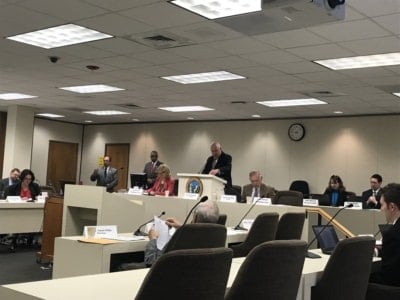

Since the creation of the office of lieutenant governor in 1868, voters have elected the governor and lieutenant governor separately instead of on a joint ticket. As a result, every so often North Carolina ends up with a governor and lieutenant governor from different political parties, as we have now — Governor Roy Cooper is a Democrat while Lieutenant Governor Dan Forest is a Republican.
Reader Leslie Ann Jackson asked, “Why are the lieutenant governor and governor elected separately?” The short answer is because it was set up that way in the constitution of 1868. The real story is more complex.
The constitution of 1868
In 1867, Congress passed the Reconstruction Acts, which laid out the terms for southern states to be re-admitted to the Union after the Civil War. One of those terms was that southern states must rewrite their state constitutions. In compliance with Congress, voters elected delegates to the North Carolina Constitutional Convention in 1867, and the convention began on January 14, 1868.
The constitution of 1868 was a radical departure from the previous state constitution. According to Encyclopedia of North Carolina, delegates modeled the 1868 constitution after the constitution of Ohio and other northern states. It abolished slavery, expanded the right to vote to all men regardless of race, and removed property and religious qualifications for voting and holding office.
The constitution of 1868 also created the office of lieutenant governor, who, along with the governor, was to be popularly elected every four years. The constitution gave the lieutenant governor the roles of head of the Senate and first in line to succeed the governor should anything happen to him (or her).
In addition to lieutenant governor, the 1868 constitution established six new executive offices to be popularly elected, giving North Carolina its “long ballot.”
The 1868 constitution remained in effect until 1971, when voters ratified a new state constitution. The 1971 constitution expanded the role of lieutenant governor and maintained the separate election of lieutenant governor and governor, although the Constitution study commission report did recommend shortening the ballot of statewide elected officials. Ferrel Guillory reported on this issue in the June 1988 issue of Insight:
“The commission wanted to retain the Governor, Lieutenant Governor, Auditor, Treasurer, and Attorney General as statewide elected officials. It proposed having the Secretary of State and the Commissioners of Labor, Insurance, and Agriculture appointed by the Governor, and the Superintendent of Public Instruction appointed by the State Board of Education.”
As Guillory explained, the commission felt most voters did not know enough about the duties of all 10 executive offices to make an informed vote. Additionally, the commission believed the direct election of each office hampered the governor’s ability to effectively run the state government because the officials had little incentive to work with him (or her).
Despite these recommendations, the offices are still elected by popular vote today.
Efforts to abolish the separate election of governor and lieutenant governor
Many states have moved away from the separate election of governor and lieutenant governor and placed them on the same ticket. According to the Book of the States, North Carolina is one of 20 states where the governor and lieutenant governor are still elected separately.
The most recent effort to jointly elect the governor and lieutenant governor failed in 2015. Because the direct election of governor and lieutenant governor is written in the constitution, any change would require a constitutional amendment. In April 2015, the House failed to gain the three-fifths majority necessary to pass a constitutional amendment to require each party’s candidates for governor and lieutenant governor to run jointly on the same ticket.
According to a News and Observer article about the amendment, supporters of the bill believed it would enable a smooth transition of power if anything were to happen to the governor whereas opponents felt the separate election of lieutenant governor served as an important check on the power of the governor:
“’The lieutenant governor is a heartbeat away from the governor’s mansion,’ said Rep. Bert Jones, a Republican from Reidsville, a primary sponsor of the bill. ‘Those two should be working together and they should be doing so in such a way that, Lord forbid, if something were to happen to the governor, the lieutenant governor makes a smooth transition into that office.’”
“‘Part of the reason for having an independent lieutenant governor, even if they’re the same party, is to limit the power of the governor, the influence and the control that he might exercise over the Senate through someone who was maybe, for lack of a better word, his lackey,’ said Rep. Larry Pittman, a Republican from Concord.”
As this AskNC question demonstrates, North Carolinians are interested in this issue, especially when the current governor and lieutenant governor are from different political parties. It remains to be seen whether legislators feel strongly enough about this issue to override tradition and pass a constitutional amendment.
For an in-depth look at the roles and responsibilities of the lieutenant governor, see the following reports from the Center’s previous research:
The Lieutenant Governor — A Legislative or Executive Office?
The Lieutenant Governorship in North Carolina: An Office in Transition


